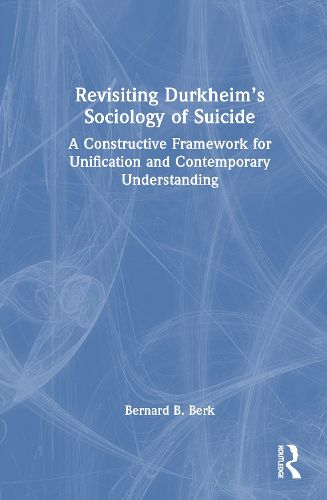Readings Newsletter
Become a Readings Member to make your shopping experience even easier.
Sign in or sign up for free!
You’re not far away from qualifying for FREE standard shipping within Australia
You’ve qualified for FREE standard shipping within Australia
The cart is loading…






This book explicates Durkheim's theory of suicide, reveals its ambiguities and contradictions, and sets forward a new framework to unify its various hypotheses.
Since Durkheim never fully integrated his theory, this has led to varying interpretations of Durkheim's theories among scholars, and subsequently, this caused a failure to create a cumulative body of findings about suicide due to inconsistency. This book hopes to remedy that condition by clarifying and unifying his overall theory, so it can be understood and tested for sociological theory and thinking today. Durkheim produced his groundbreaking treatise, Suicide, establishing sociology as a distinctive field of study and demonstrating that social forces are real and can be studied scientifically. He argued that the volume, types, and patterns of suicide are a result of the social forces generated by the moral structure of each society and named these forces integration and regulation. This demonstrated that suicide is not alien to society but instead is a byproduct of the way society is organized. Though his work is over a century old, the problems it confronts, of society's inability to maintain unity and cohesion in the face of increasing diversity, are as relevant today as in Durkheim's time.
By illuminating the contours of Durkheim's famous volume and providing a critical new perspective that shows how its features work, this volume will be an essential resource for sociologists and social theorists of classical and historical sociology, as well as a key volume for courses in sociology of mental health and cultural sociology. It will also serve as an important guide for students and instructors in studying a foundational text and thinker for the discipline.
$9.00 standard shipping within Australia
FREE standard shipping within Australia for orders over $100.00
Express & International shipping calculated at checkout
Stock availability can be subject to change without notice. We recommend calling the shop or contacting our online team to check availability of low stock items. Please see our Shopping Online page for more details.
This book explicates Durkheim's theory of suicide, reveals its ambiguities and contradictions, and sets forward a new framework to unify its various hypotheses.
Since Durkheim never fully integrated his theory, this has led to varying interpretations of Durkheim's theories among scholars, and subsequently, this caused a failure to create a cumulative body of findings about suicide due to inconsistency. This book hopes to remedy that condition by clarifying and unifying his overall theory, so it can be understood and tested for sociological theory and thinking today. Durkheim produced his groundbreaking treatise, Suicide, establishing sociology as a distinctive field of study and demonstrating that social forces are real and can be studied scientifically. He argued that the volume, types, and patterns of suicide are a result of the social forces generated by the moral structure of each society and named these forces integration and regulation. This demonstrated that suicide is not alien to society but instead is a byproduct of the way society is organized. Though his work is over a century old, the problems it confronts, of society's inability to maintain unity and cohesion in the face of increasing diversity, are as relevant today as in Durkheim's time.
By illuminating the contours of Durkheim's famous volume and providing a critical new perspective that shows how its features work, this volume will be an essential resource for sociologists and social theorists of classical and historical sociology, as well as a key volume for courses in sociology of mental health and cultural sociology. It will also serve as an important guide for students and instructors in studying a foundational text and thinker for the discipline.